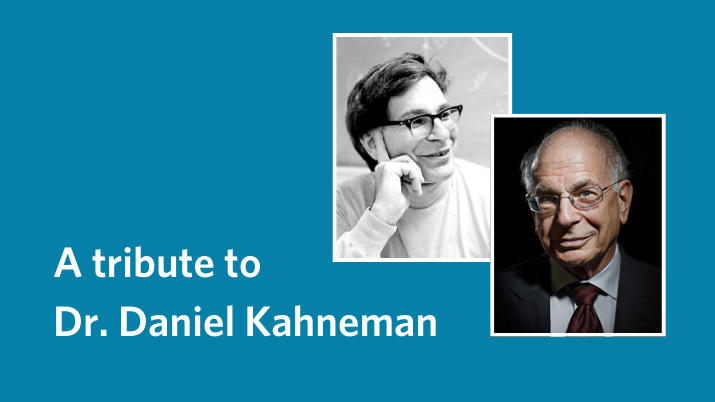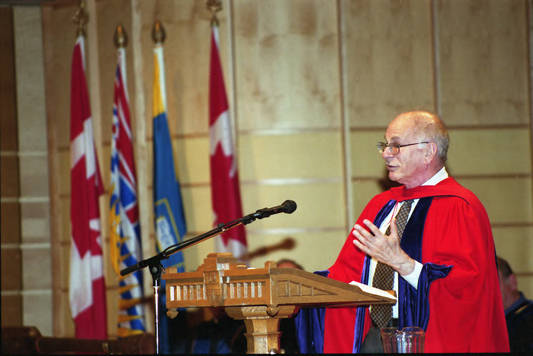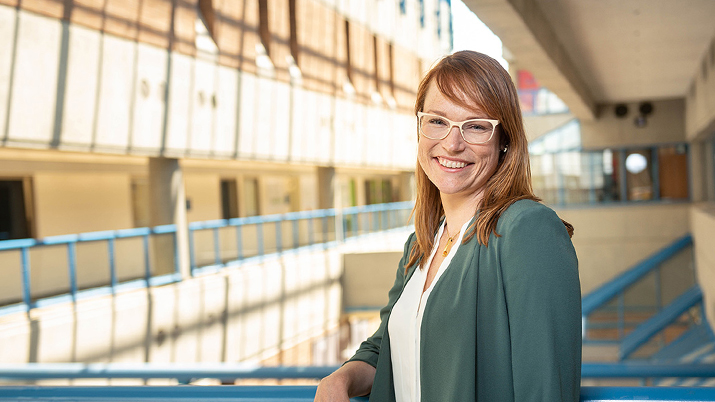

It is with heavy hearts that we bid farewell to one of our most distinguished scholars, Dr. Daniel Kahneman.
Dr. Kahneman, a former faculty member in UBC’s Department of Psychology, died on March 27 at the age of 90. His pioneering research revolutionized our understanding of human behaviour and decision-making.
Dr. Kahneman was awarded the 2002 Nobel Memorial Prize in Economic Sciences, an honour he shared with Dr. Vernon Smith. His Nobel citation commended his groundbreaking work for “inspiring a new generation of researchers in economics and finance to enrich economic theory using insights from cognitive psychology into intrinsic human motivation.”
Dr. Kahneman’s academic pursuits led him to earn a PhD in Psychology from the University of California, Berkeley. His career took him to various prestigious institutions, including the University of British Columbia, University of California, Berkeley, and Princeton University, where he was Professor Emeritus of Psychology and Public Affairs.
His tenure at UBC left an indelible mark on our community. Dr. Kahneman and his wife Dr. Anne Treisman joined UBC Psychology together in 1978. During his time at UBC, it was Dr. Kahneman’s collaboration with Dr. Amos Tversky that led to the development of prospect theory. Their research showed that human decision-making is often systematically irrational and influenced by cognitive biases.
He inspired countless students and colleagues with his intellect and passion for understanding the complexities of human behaviour. Dr. Peter Suedfeld, Professor Emeritus of Psychology at UBC and Department Head when Drs. Kahneman and Treisman joined the department, shares his personal thoughts about his colleagues and friends.
“Danny and Anne were not only brilliant and creative psychologists, but popular teachers, mentors, and dedicated members of the departmental and university communities.”
Danny and Anne were not only brilliant and creative psychologists, but popular teachers, mentors, and dedicated members of the departmental and university communities. They were hired during my headship, but I was on away on study leave at the time, so much of our negotiation was by telephone. Danny sounded surprised when I informed him that they would be expected to teach a normal course load, which I don’t remember exactly, but think it was two undergrad courses per semester plus a graduate course every year. We had a very friendly exchange, during which I told him my view that research and teaching were equal parts of a professor’s job, and I did not believe that excellence or productivity in one justified doing less than one’s share of the other. They accepted that argument – and our job offer.
Both became close friends, and we socialized frequently as a foursome with Phyllis (this was before she and I got married). All of us were fond of theatre, and went often. Danny was the only one who, if he didn’t like a play, would walk out at the intermission and go home. Anne and we would stick it out, then we would drive her home and the four of us had drinks and discussed what was good and what was bad about the performance. The talk then moved on to all kinds of topics and usually lasted for several hours.
Another frequent activity was cross-country skiing. Our excursion was usually to Cypress, and included Danny and his stepson (Anne’s son Dan, from a previous marriage), and Phyllis and me with one or more of my kids (from a previous marriage). For clarity, Danny and Dan were always called just so. Danny was the only person I ever skied with who would fall down while standing still on his x-country skis, as well as falling often while on the move. When I asked him why, he said that he was never sure where his knees were.
Danny was very fond of Phyllis’s cooking. He usually asked for seconds, especially of dessert. One memorable occasion was when we had them over for a Seder, the highly ritualized and tradition-laden first meal of Passover. The first course (after some ritual starters) was always chicken soup with matzo balls. Danny loved them, and he asked if there were any more “kneidlech” (in Yiddish). Phyllis, who – like Anne – isn’t Jewish, didn’t understand; but she didn’t want to show that, so she said there weren’t any more. A little while later, Danny wandered out into the kitchen and saw a pot full of them simmering on the stove. In a very hurt voice, he asked why Phyllis hadn’t wanted to give him any more matzo balls when there were so many still in the pot. So we had to explain the situation, and everybody had a good laugh.
On a more serious note, in one of our conversations Danny told me that if during an entire career a scientist had one really good idea, that was fortunate and no more was to be expected. Two such ideas would be very unusual. As we know, he and Anne both had more than two, disconfirming the hypothesis. We never returned to that topic, so I don’t know whether he changed his view on the matter.
I was very upset when Danny and Anne informed us that they were thinking of accepting an offer from Berkeley. I succeeded in getting them to agree to take a year’s leave to explore whether they liked it there. I hoped they would come back; they both really liked UBC and Vancouver, and Anne was especially reluctant to leave. Regrettably, this arrangement was not feasible; they had to decide right then. With mixed feelings, they decided to go. They didn’t stay there very long, and moved on to Princeton, my graduate Alma Mater, so we stayed in touch. They also continued contact with several other people they had known when they were here.
We got together with them several times after that in various places, including when they came back to Vancouver for the conferring of their honorary doctorates from UBC. I also visited with Danny in New York City, where he lived after he retired from Princeton. In fact, we had planned to have lunch together when he called with the sad news that Anne had just died. They had been a great couple. She was an outstanding cognitive scientist herself, but also had a personality that complemented Danny’s. I think that everybody here who had contact with them will miss them both. I know that Phyllis and I do, and will.


Dr. Daniel Kahneman speaking at the congregation ceremony where he received an honorary degree from UBC in 2004.
Dr. Jiaying Zhao, Associate Professor in the Department of Psychology and the Institute for Resources, Environment and Sustainability at UBC, shares how Dr. Kahneman’s work inspired her to pursue decision-making research.
“I became so captivated by his research in my undergrad that I decided to conduct my BA thesis project on decision-making, which kickstarted my passion for this field.”
Danny’s work with Amos Tversky started the field of judgment and decision making (JDM) and revolutionized economics as a discipline. I became so captivated by his research in my undergrad that I decided to conduct my BA and MA thesis projects on decision making. When I was doing my PhD at Princeton University, Danny was well into his retirement, but he would still show up to seminars and give talks at Princeton, so I got to chat with him when he was on campus. I remember a classic comment of his was "I still don't believe it" to most study results, and he never seemed to be satisfied with any study, but it was his sharp critical mind and high standards for evidence that generated a rigorous and ground-breaking body of research that came to be JDM and behavioral economics today.When I arrived at UBC for my job in 2013, Danny emailed me to say "Congratulations, UBC is a great place, Anne and I didn't want to leave." Danny's compliment carried a lot of weight in reassuring me that I made a good choice. In 2019, I invited Danny to give a virtual colloquium on his latest book Noise. This is also the last time I talked to him. I miss his critical voice.
While we mourn the loss of our brilliant colleague and mentor, we celebrate the enduring legacy of Dr. Daniel Kahneman—whose insights and ideas will continue to live on in our memories, in our labs, and in our classrooms.
Dr. Luke Clark, a Professor in the Department of Psychology and Director of the Centre for Gambling Research at UBC, was also inspired by Dr. Kahneman’s wide-reaching research.
“Kahneman was at UBC before I arrived here, but I was honoured to meet him once in Cambridge, and his work is absolutely foundational for anyone interested in the psychology of risk and choice – in fact, we were covering his work in my 101 class on the day that he passed.”
Our heartfelt sympathies go out to all of Danny’s family and loved ones. He will be deeply missed.
Read more about Dr. Kahneman’s history and legacy in this Princeton University tribute.


